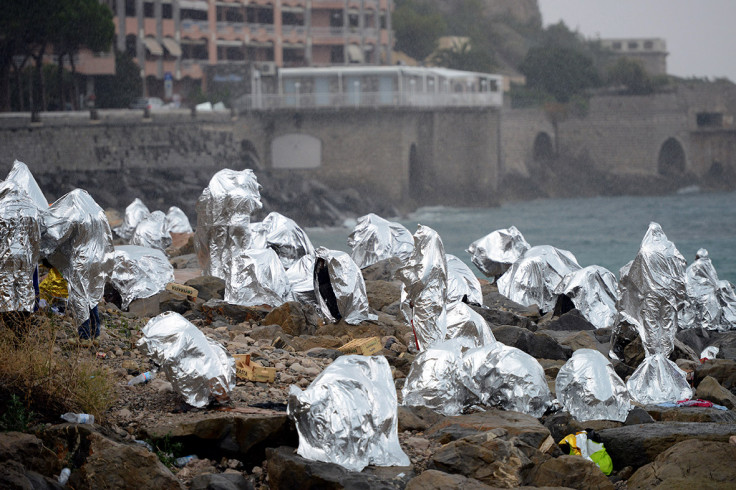Mediterranean crisis: Renzi attacks 'selfish' France, threatens to grant migrants safe passage to Europe

Italy is said to be considering granting thousands of migrants transit permits to the rest of Europe in response to what Rome says is the lack of EU support in handling the unprecedented inflow of asylum seekers that is heightening tensions across the country.
The government hinted it might take retaliatory measures if its continental allies would not endorse a common refugee redistribution plan to alleviate pressure on its overflowing reception centres.
Prime Minister Matteo Renzi accused France of "selfishness" after Paris tightened border controls to prevent migrants from crossing.
"This is a complex situation," he told Ansa news agency. "We cannot allow France to have vessels in the Mediterranean while leaving [migrants] in Italy."
Renzi spoke after France's interior minister, Bernard Cazeneuve, sent back Rome's appeals to EU solidarity, telling BFMTV it was Italy's duty to take care of the thousands of illegal migrants reaching its shores from northern Africa.
"They [migrants] are not supposed to cross," he said, in comments that were met with anger and frustration in Italy. Cazeneuve also suggested the setting up of European-funded reception centres in Italy to process asylum applications.
Meanwhile, hundreds of migrants wanting to reach northern Europe have been stranded for several days in the border town of Ventimiglia, a few kilometres from the French Riviera, after Paris ordered police to prevent them from entering the country.
Refusing to go back, more than 100 would-be refugees from Sudan, Libya and Eritrea have been sleeping on the rocks by Mediterranean waters, while dozens of others found temporarily shelter at the town's train station.
"We are not going back," some chanted during a protest at the weekend. "Where are human rights? Where is humanity?" said Naser Alden Abdulaziz, a migrant from Darfur, Sudan.
Angelino Alfano, Italy's interior minister, has described the Ventimiglia stand-off as a "slap in the face to Europe" and pledged to raise the issue at an upcoming EU ministerial meeting in Luxembourg.
"I will say with great clarity: Kids, either we do equal distribution of migrants in Europe, or we organise refugee camps in Libya, or we organize a serious policy of repatriation," he told Sky TG24. "If Europe doesn't follow through on its responsibility and solidarity, it will find a different Italy."
Emergency measures to accommodate would-be refugees were being taken also in Rome and Milan, where hundreds were camping in the vicinity of train stations.
Renzi claimed a "Plan B" was ready if fellow EU countries did not adopt a more conciliatory stance.
Although the details of such a plan were not specified, Italian press reported several options were being vetted.
Il Corriere della Sera newspaper claimed one idea is denying port access to European vessels involved in rescue operations in the Mediterranean, thus forcing each country to take responsibility of the migrants it saves in international waters. The Royal Navy warship HMS Bulwark is among ships currently involved in rescue efforts off Libya.
Based on the legal principle that a vessel is considered a floating extension of its flag state, analysts said this idea was unlikely to be implemented as it would put Rome at the fringes of humanitarian law.
Another proposal aired by the newspaper was to issue migrants with a temporary permit to enter the Schengen Area, de facto allowing them to move freely within in Europe.
"Countries deploying border police to stop them would then be in breach of international treaties," explained Alfonso Giordano, a professor of migratory fluxes at Rome's Free International University for Social Studies (LUISS), adding this was a more feasible step for Italy in the short term.
"It is however a little tit-for-tat that doesn't resolve the main issue. As long as the EU doesn't find common strategy the situation is only going to get worse. The problem is that even if they agree in principle, the various governments don't know how to sell a decision [to redistribute migrants] to the general public."
Rome was also said to be considering increasing aid and co-operation with a number of African countries to speed up repatriation process of migrants not eligible for asylum.
Austria and Switzerland have also stepped up border controls and were returning migrants caught crossing to Italy.
Under EU rules, would-be refugees are supposed to be fingerprinted and apply for asylum in the first country they reach, which is often Italy.
However, an overwhelming majority of them prefer to slip away from reception centres almost as soon as they arrive, without being officially registered, and head towards northern Europe.
According to estimates, more than 100,000 people have already crossed the Mediterranean this year and more than 50% of them have arrived in Italy.
© Copyright IBTimes 2025. All rights reserved.




















